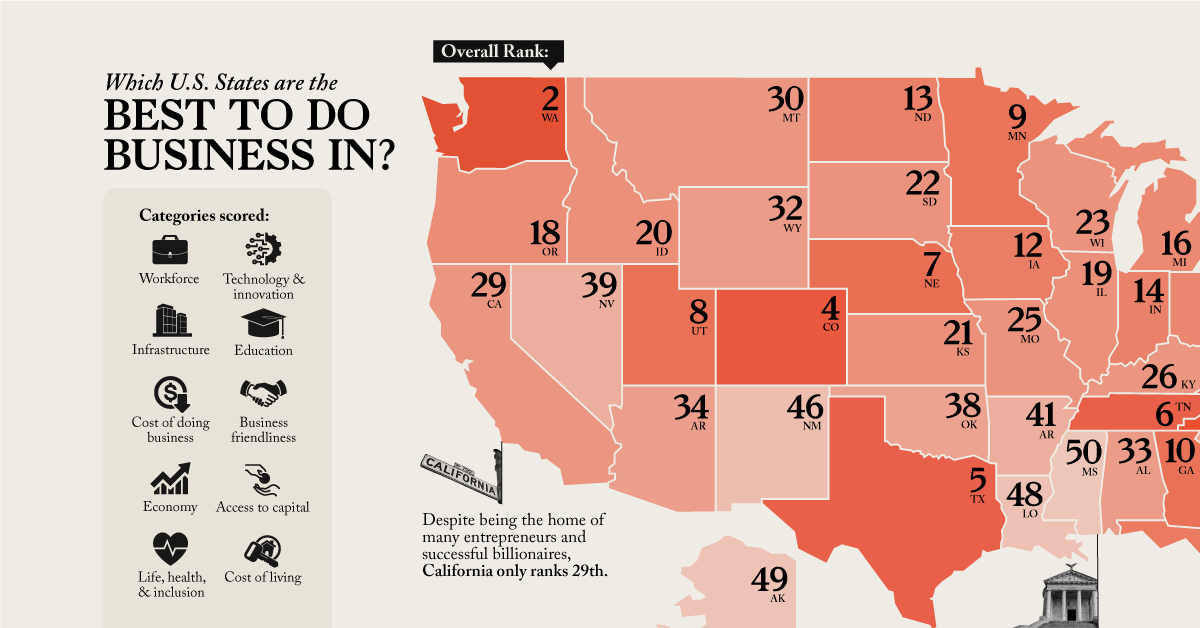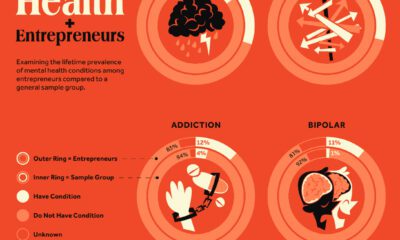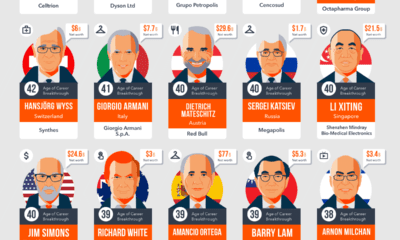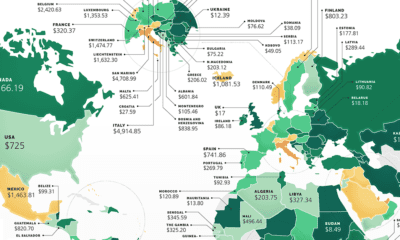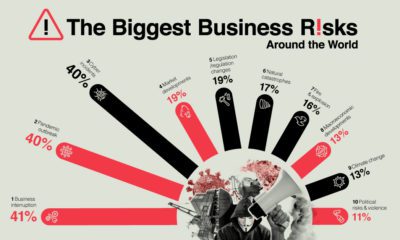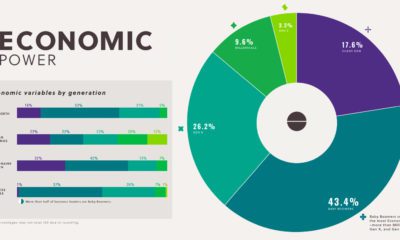Economy
Ranked: America’s Best States to Do Business In
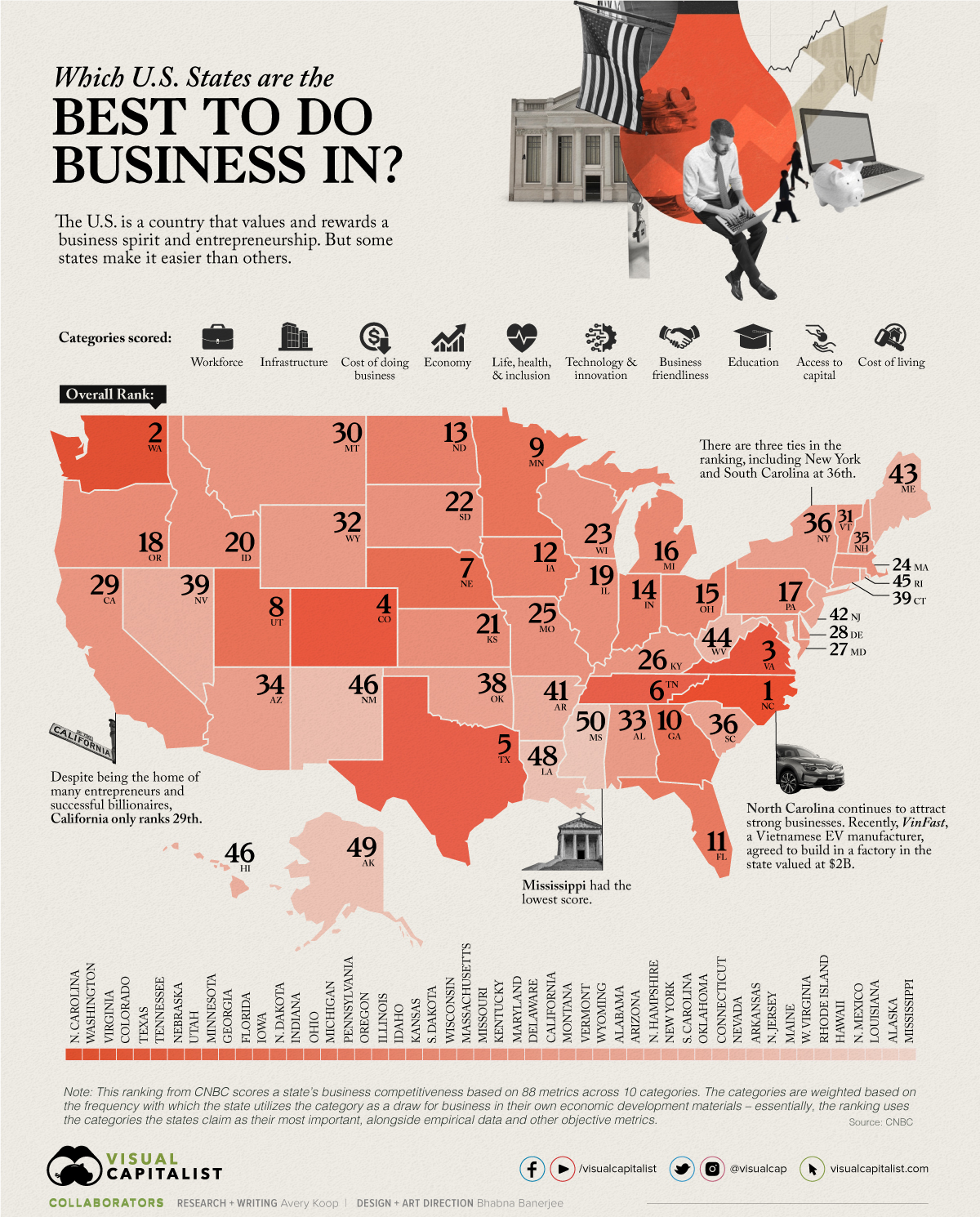
Ranked: America’s Best States to Do Business In
The United States often ranks as one of the best countries to start a business in, but the ease with which one can do business varies state by state. There are many considerations that factor into starting a business like the available workforce, the condition of local infrastructure, access to investors, a culture that’s open to business, and so on.
This map ranks America’s best states to do business in based on a study from CNBC which measured 88 factors across 10 broad categories.
Methodology
Here is a further breakdown of the weight given to each of the 10 categories:
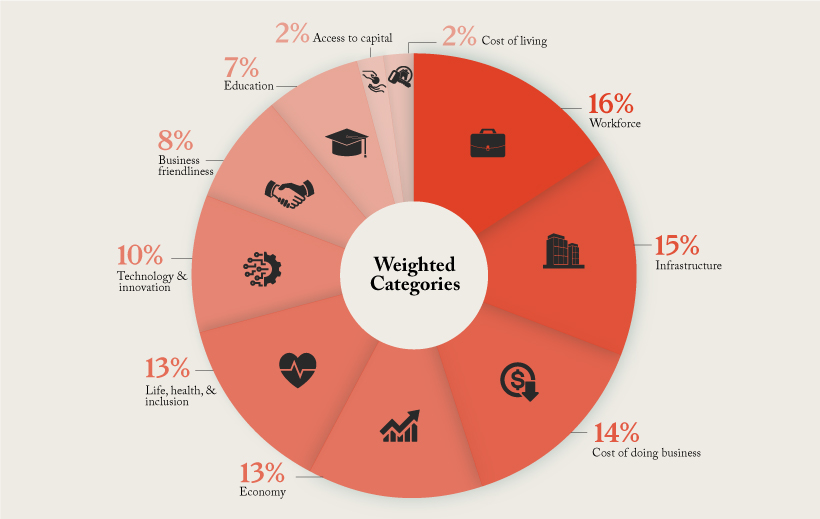
The Most Business Friendly States
North Carolina—coming in first place in the ranking—attracts an extremely talented and innovative workforce, largely thanks to the state’s investment in its Research Triangle Regional Partnership (RTRP).
| Overall Rank | State |
|---|---|
| #1 | North Carolina |
| #2 | Washington |
| #3 | Virginia |
| #4 | Colorado |
| #5 | Texas |
| #6 | Tennessee |
| #7 | Nebraska |
| #8 | Utah |
| #9 | Minnesota |
| #10 | Georgia |
| #11 | Florida |
| #12 | Iowa |
| #13 | North Dakota |
| #14 | Indiana |
| #15 | Ohio |
| #16 | Michigan |
| #17 | Pennsylvania |
| #18 | Oregon |
| #19 | Illinois |
| #20 | Idaho |
| #21 | Kansas |
| #22 | South Dakota |
| #23 | Wisconsin |
| #24 | Massachusetts |
| #25 | Missouri |
| #26 | Kentucky |
| #27 | Maryland |
| #28 | Delaware |
| #29 | California |
| #30 | Montana |
| #31 | Vermont |
| #32 | Wyoming |
| #33 | Alabama |
| #34 | Arizona |
| #35 | New Hampshire |
| #36 | New York |
| #36 | South Carolina |
| #38 | Oklahoma |
| #39 | Connecticut |
| #39 | Nevada |
| #41 | Arkansas |
| #42 | New Jersey |
| #43 | Maine |
| #44 | West Virginia |
| #45 | Rhode Island |
| #46 | Hawaii |
| #46 | New Mexico |
| #48 | Louisiana |
| #49 | Alaska |
| #50 | Mississippi |
Notably, there are three ties in the ranking: New York and South Carolina had the same score, tying for 36th, Connecticut and Nevada tied for 39th, and Hawaii and New Mexico tied for 46th.
Other states ranking high on the list are Washington, Virginia, and Colorado. One of the newest individual metrics CNBC took into consideration was an openness to the cannabis industry, likely playing into Colorado’s move up from 8th to 4th compared to last year.
Some states that perhaps surprisingly don’t crack the top 10 include California and New York, both often considered centers of finance and entrepreneurship. But with the high costs of living and of starting a business in those states, their overall score is reduced.
A Look at the Scoring — North Carolina, California, and Nevada
To better understand how this ranking works we’ve broken down three different states and how they ranked in all 10 categories that gave them their overall spot. Here’s a brief look at their place in each category:
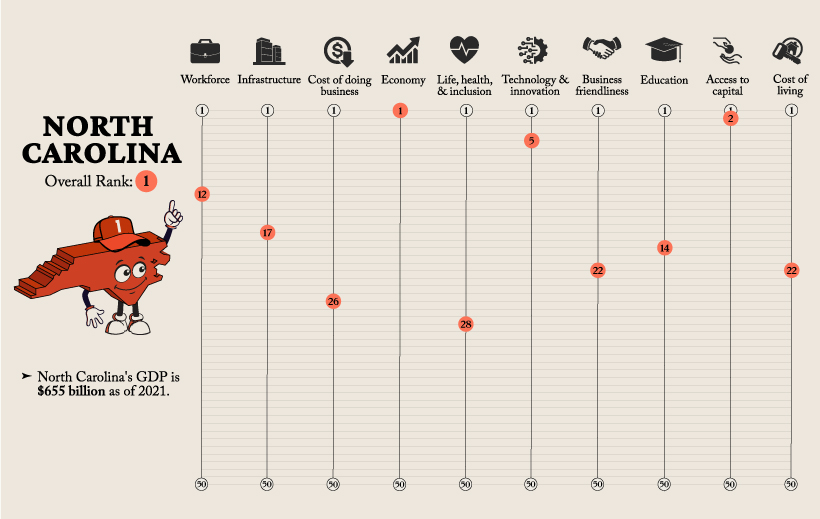
While North Carolina is the number one state to do business in and has an extremely strong economy, they are 26th when it comes to the Cost of Doing Business.
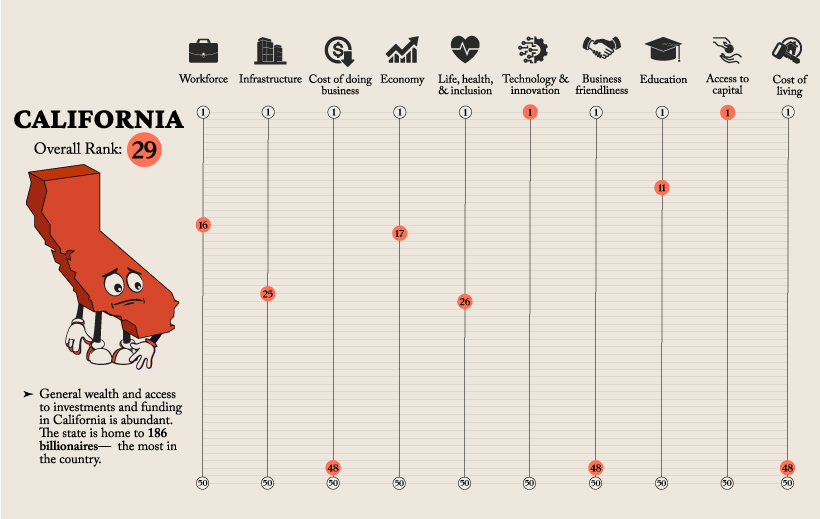
Whereas California ranks low overall, the state ranks first in terms of Technology and Innovation, as well as Access to Capital.
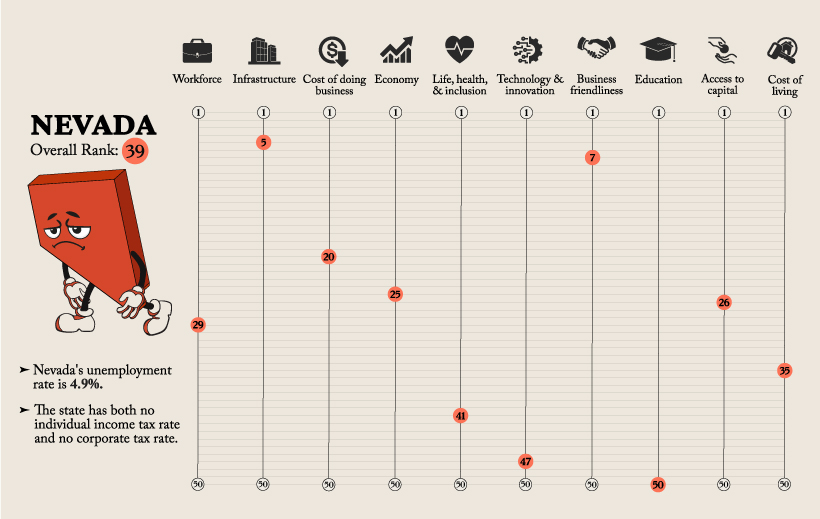
Although Nevada scored highly in the Infrastructure and Business Friendliness categories, the state scored poorly in Technology and Innovation, and was dead last in the Education category.
Doing Business in America
New business applications have actually decreased 4% this year in comparison to the same timeframe in 2021.
Here’s a look at new business applications by region as of July 2022:
- Northeast: 63,058
- Midwest: 70,827
- South: 197,663
- West: 94,150
New business applications in July were the highest in the retail trade industry, numbering around 69,000 new applications, according to the U.S. Census Bureau. Applications for professional service businesses were the second highest at 53,000, followed closely by construction businesses at 43,000.
Here’s a closer look at the industry breakdown:
| Industry | Number of Applications |
|---|---|
| Retail Trade | 68,974 |
| Professional Services | 53,321 |
| Construction | 43,442 |
| Other Services | 38,605 |
| Transportation and Warehousing | 34,952 |
| Administrative and Support | 31,602 |
| Health Care and Social Assistance | 25,725 |
| Accommodation and Food Services | 24,166 |
| Real Estate | 23,953 |
| Finance and Insurance | 18,890 |
| Arts and Entertainment | 12,684 |
| Unclassified | 12,350 |
| Wholesale Trade | 8,893 |
| Information | 7,802 |
| Educational Services | 5,762 |
| Manufacturing | 5,744 |
| Management of Companies | 4,166 |
| Agriculture | 3,703 |
| Mining | 542 |
| Utilities | 421 |
A potential looming recession, alongside rising interest rates and inflation, may be creating a sense of cautiousness among businesspeople, leading to the lower rate of business applications compared to last year. And, at existing companies, the economic situation has lead to cuts in growth forecasts and subsequently, major layoffs.
But overall, the U.S. is a country which values entrepreneurship—even during the pandemic, massive spikes in new business formations were recorded—and certain industries and states will continue to flourish in any business environment.
Misc
How Do Chinese Citizens Feel About Other Countries?
What is the Chinese public’s view of world powers? This visual breaks down Chinese sentiment towards other countries.
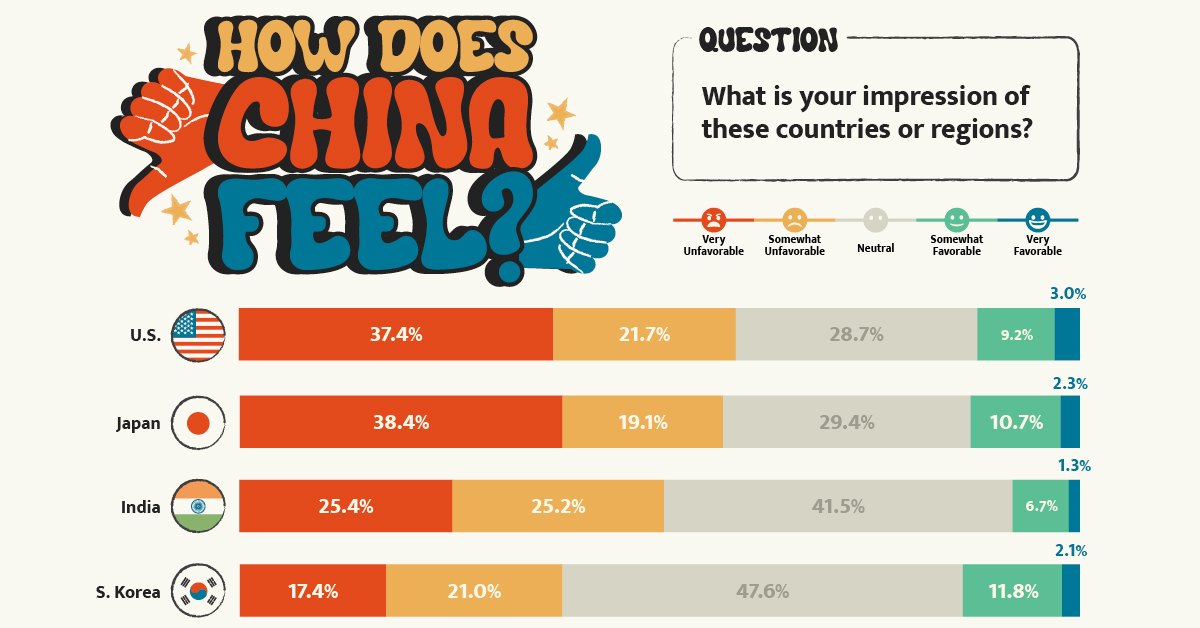
Public Opinion: How Chinese Citizens Feel About Other Countries
Tensions over Taiwan, the COVID-19 pandemic, trade, and the war in Ukraine have impacted Chinese sentiment towards other countries.
This visualization uses data from the Center for International Security and Strategy (CISS) at Tsinghua University to rank survey responses from the Chinese public on their attitudes towards countries and regions around the world.
Chinese Sentiment Towards Other Countries in 2023
In the Center’s opinion polls, which surveyed a random sample of more than 2,500 Chinese mainland adults in November 2022, Russia came out significantly ahead.
Just under 60% of respondents held Russia in a favorable view, with 19% seeing the country as “very favorable.” Contrast that to the mere 12% that viewed the U.S. in a positive light.
Here’s a closer look at the data. The percentages refer to the share of respondents that voted for said category.
| Country/Region | Very Unfavorable | Somewhat Unfavorable | Neutral | Somewhat Favorable | Very Favorable |
|---|---|---|---|---|---|
| 🇺🇸 United States | 37.4% | 21.7% | 28.7% | 9.2% | 3.0% |
| 🇯🇵 Japan | 38.4% | 19.1% | 29.4% | 10.7% | 2.3% |
| 🇮🇳 India | 25.4% | 25.2% | 41.5% | 6.7% | 1.3% |
| 🇰🇷 South Korea | 17.4% | 21.0% | 47.6% | 11.8% | 2.1% |
| 🇪🇺 European Union | 9.3% | 15.6% | 57.6% | 14.1% | 3.3% |
| Southeast Asia | 7.1% | 13.1% | 59.5% | 16.8% | 3.5% |
| 🇷🇺 Russia | 3.0% | 4.8% | 33.7% | 39.4% | 19.0% |
Japan ranked just below the U.S. in terms of overall unfavorability, though a slightly higher share of respondents saw Japan as “very unfavorable” compared to America. This is likely due to both modern tensions in the East China Sea over mutually claimed islands and historical tensions over the Sino-Japanese Wars.
Chinese sentiment towards India was also unfavorable at just over 50%, though notably the country also received the lowest favorability rating at just 8%.
Additional Survey Findings
The survey also found that 39% of Chinese people get their information on international security from Chinese state-run media (mainly through TV), with an additional 19% getting information from government websites and official social accounts. Conversely, only 1.7% get their news from foreign websites and foreign social media, partially due to the Great Firewall.
When asked about different international security issues, the biggest shares of Chinese citizens ranked the following as their top three:
- Pandemics (12.9%)
- Disputes over territory and territorial waters (12.9%)
- China-U.S. relations (12.0%)
The pandemic’s high score reflects the harsher impact COVID-19 had on China. Chinese borders were shut for years and the public faced intense measures to reduce spread.
In terms of other world events, the majority of Chinese people align with a more “Eastern” viewpoint. For example, in regards to the war in Ukraine, the report found that:
“About 80 percent of the respondents believe the U.S. and Western countries should be held most accountable [for the war], while less than ten percent of the respondents argue that Russia is mainly responsible.”– Center for International Security and Strategy, Tsinghua University
Overall, the views of the Chinese public reflect the opposite of those found in many Western countries. They provide an important insight that it is not just the Chinese government holding particular views about the world, but the Chinese public as well.
-

 Energy3 weeks ago
Energy3 weeks agoHow Big is the Market for Crude Oil?
-
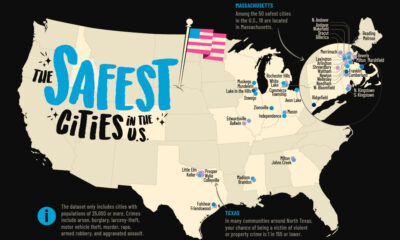
 Crime7 days ago
Crime7 days agoMapped: The Safest Cities in the U.S.
-
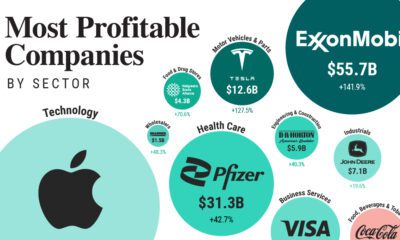
 Markets2 weeks ago
Markets2 weeks agoRanked: The Most Profitable U.S. Companies, by Sector
-

 Technology5 days ago
Technology5 days agoHow Long it Took for Popular Apps to Reach 100 Million Users
-
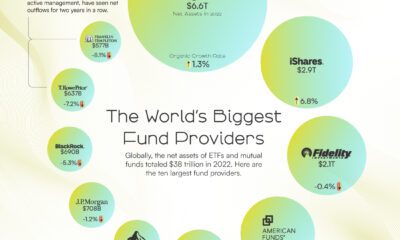
 Markets4 weeks ago
Markets4 weeks agoThe World’s Biggest Mutual Fund and ETF Providers
-

 Brands2 weeks ago
Brands2 weeks agoBrand Reputations: Ranking the Best and Worst in 2023
-
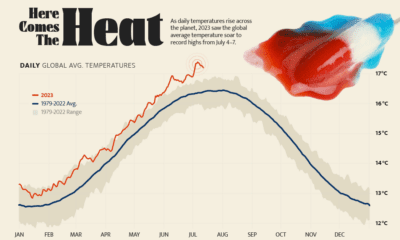
 Environment5 days ago
Environment5 days agoHotter Than Ever: 2023 Sets New Global Temperature Records
-

 Datastream4 weeks ago
Datastream4 weeks agoCan You Calculate Your Daily Carbon Footprint?




